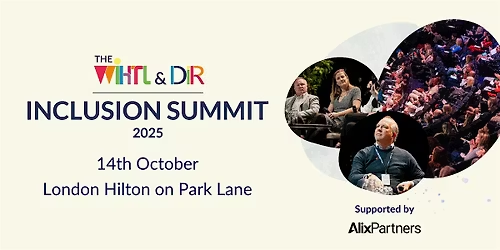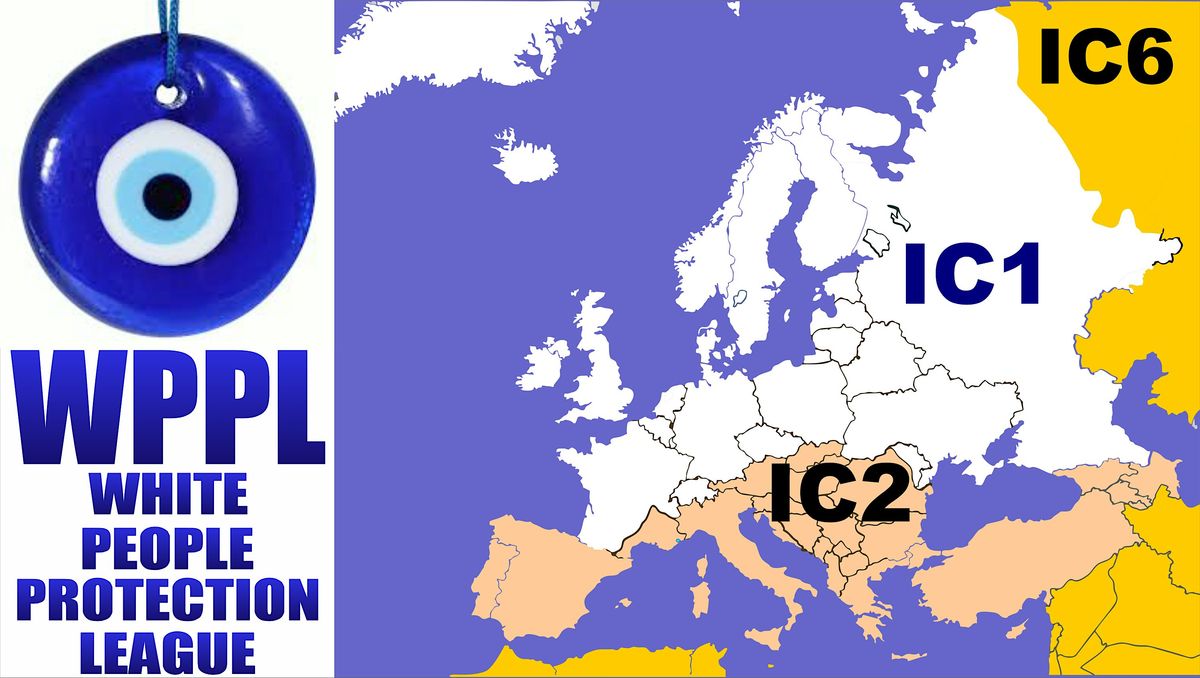
About this Event
European Racial Partition (ERP) for Reparatory Justice and a Better World
The European Racial Partition (ERP) as envisioned by the African Diaspora Equity and Justice Alliance (ADEJA) proposes a radical reconfiguration of Europe based on racial and ethnic lines. This plan aims to deliver reparatory justice to Black and Mixed-Black people, addressing historical inequities and fostering a better world. The maps provided illustrate the proposed ERP and the UK's race and ethnicity codes. This article will delve into the details of these maps, the UK race and ethnicity classification, and the overarching goals and methods of ADEJA.
The ADEJA weekly meetings serve as the organizational backbone for the African Diaspora Equity and Justice Alliance. These gatherings provide a platform for discussing strategies, sharing updates, and coordinating efforts towards achieving reparatory justice. Key topics include the progress of the ERP, the handling of reparation claims, and collaboration with international entities. By fostering regular communication, ADEJA ensures that all stakeholders remain aligned and informed.
Map Descriptions
The two maps provided illustrate the proposed European Racial Partition (ERP). The first map focuses on Europe, highlighting the regions designated for IC1 (White Northern European) and IC2 (Dark Southern European). The second map expands the view to include parts of Asia and North Africa, showing the regions for IC1, IC2, IC5 (Oriental), and IC6 (Arab, Mixed-Race, Middle Eastern).
- First Map:
- IC1: Covers the majority of Northern Europe, including countries like the UK, Ireland, Scandinavia, and parts of Central Europe.
- IC2: Encompasses Southern Europe, including countries such as Spain, Italy, Greece, and the Balkans.
- IC6: Includes regions in Eastern Europe and the Middle East.
- Second Map:
- IC1: Similar coverage as the first map but extends to include more detailed boundaries within Northern Europe.
- IC2: Detailed depiction of Southern Europe.
- IC5: Covers China and surrounding areas.
- IC6: Expands to include a broader region in the Middle East and parts of Central Asia.
Race and Ethnicity Diagram
The diagram provides a comprehensive list of the UK's race and ethnicity codes, color-coded for clarity. These codes are as follows:
- IC1: White Northern European
- Includes subcategories such as White British, White Irish, and various other White European identities.
- IC2: Dark Southern European
- Covers ethnicities such as Albanian, Greek, Italian, and Turkish.
- IC3: Black
- Includes Black African, Black Caribbean, and other Black backgrounds.
- IC4: Asian
- Encompasses Indian, Pakistani, Bangladeshi, and other Asian identities.
- IC5: Oriental
- Covers Chinese, Japanese, Korean, and other Oriental identities.
- IC6: Arab, Mixed-Race, Middle Eastern
- Includes Arab, Mixed-Race, and various Middle Eastern identities.
- IC7: Not Known / Not Stated
- For individuals whose racial background is not known or not stated.
The ERP aims to create a structured and just system for managing racial and ethnic identities within Europe. This partition is designed to:
- Enhance Social Cohesion: By clearly delineating regions based on racial and ethnic identities, the ERP seeks to reduce conflicts and promote harmonious coexistence.
- Address Historical Injustices: The partition is part of a broader reparatory justice initiative to rectify past wrongs against Black and Mixed-Black populations.
- Promote Cultural Preservation: By recognizing and preserving distinct racial and ethnic identities, the ERP ensures that cultural heritage is maintained and celebrated.
Historical Context and Justification
The European Racial Partition (ERP) is deeply rooted in the historical context of colonialism, slavery, and systemic racism that has marginalized Black and Mixed-Black communities. The ERP seeks to address these historical injustices by creating a geopolitical framework that acknowledges and rectifies the socio-economic disparities resulting from these injustices.
Geopolitical Reconfiguration
The ERP involves a significant reconfiguration of European territories:
- IC1 Regions (White Northern European): These regions will include countries with predominantly White Northern European populations, ensuring that their cultural and racial identities are preserved.
- IC2 Regions (Dark Southern European): Southern European countries, characterized by a darker European demographic, will be grouped together to maintain their unique cultural and racial identity.
- IC3 Regions (Black): Black populations, including those of African and Caribbean descent, will be allocated regions where their cultural heritage can be preserved and promoted.
- IC4 Regions (Asian): This includes regions for Asian populations, ensuring their cultural and racial identities are respected.
- IC5 Regions (Oriental): Countries with significant Oriental populations will be grouped to foster cultural preservation.
- IC6 Regions (Arab, Mixed-Race, Middle Eastern): Regions for Arab and Mixed-Race populations to ensure their cultural and racial identities are maintained.
- IC7 Regions (Unknown/Not Stated): Areas designated for individuals whose racial or ethnic backgrounds are not specified.
Implementation and Enforcement
The implementation of the ERP will require robust international cooperation and legal frameworks. It will involve:
- Legislative Measures: Enacting laws to support the reconfiguration and ensure compliance with the ERP.
- Economic Policies: Implementing economic policies that support reparations and the redistribution of resources to marginalized communities.
- Cultural Programs: Establishing cultural programs to promote the preservation of distinct racial and ethnic identities.
- Educational Initiatives: Developing educational initiatives to raise awareness about the importance of the ERP and the historical context behind it.
Benefits of the ERP
- Social Stability: By addressing racial and ethnic disparities, the ERP aims to reduce social tensions and promote stability.
- Economic Equity: Ensuring that marginalized communities receive reparations and economic support will lead to more equitable economic development.
- Cultural Preservation: The ERP will help preserve the cultural heritage of various racial and ethnic groups, fostering a sense of pride and identity.
- Global Leadership: By implementing the ERP, Europe can set a precedent for other regions to address historical injustices and promote racial equity.
Challenges and Considerations
- Political Resistance: The ERP may face political resistance from groups opposed to such radical changes.
- Logistical Challenges: Implementing the ERP will involve significant logistical challenges, including the redistribution of populations and resources.
- International Cooperation: Achieving the ERP will require extensive international cooperation and support.
- Human Rights Concerns: Ensuring that the ERP respects the human rights of all individuals involved is paramount.
The UK government uses specific codes to classify individuals based on their perceived racial and ethnic characteristics. These codes are essential for administrative and statistical purposes, helping institutions understand and address issues related to race and ethnicity. The system aims to promote equality and combat discrimination by providing a structured way to recognize and analyze racial and ethnic diversity.
Mission and Objectives
ADEJA's mission is to advance the well-being, empowerment, unity, and pursuit of reparatory justice for Black Africans, the Black African diaspora, and the Mixed-Black diaspora. This mission is pursued through evidence-based claims and a commitment to addressing historical injustices.
Alignment with the UK Government
ADEJA aligns with the UK government's use of race and ethnicity codes, recognizing their value for national security and social cohesion. This alignment underscores ADEJA's commitment to promoting racial equality and combating discrimination.
Reparation Assets and Claims
ADEJA categorizes reparations into tradeable and non-tradeable assets. Tradeable assets include financial resources and commodities, while non-tradeable assets are culturally significant items dedicated to cultural restoration.
Reparations are processed on an evidence-based, claim-by-claim basis, with ADEJA collaborating with entities like the White People Protection League (WPPL) to reward whistleblowers who provide evidence leading to successful claims.
Reparation Shares
ADEJA proposes a system of reparation shares based on the percentage of Black heritage:
- 100% share for FULL BLACK
- 75% share for 3/4 BLACK
- 50% share for 1/2 BLACK
- 25% share for 1/4 BLACK
- 12.5% share for 1/8 BLACK
- 6.25% share for 1/16 BLACK
Identity Recognition
ADEJA recognizes five aspects of identity:
- Place of Birth
- Lineage
- Appearance (Visual Ethnicity)
- State of Mind/Habits
- DNA
Black Social Credit System
ADEJA has implemented a Black social credit system to incentivize actions contributing to the betterment of the IC3 Black community. This system evaluates individuals based on their behaviors, contributions, and adherence to values promoting Black betterment.
To achieve the ERP and deliver reparatory justice, ADEJA proposes several ways for the UK government to collaborate:
- Policy Support: Implement policies that support the ERP and recognize the importance of racial and ethnic classification for social justice.
- Financial Assistance: Provide financial resources to support ADEJA's reparatory initiatives and the establishment of reparation shares.
- Awareness Campaigns: Launch awareness campaigns to educate the public about the ERP and the importance of reparatory justice.
- International Collaboration: Work with international organizations to promote and adopt similar racial and ethnic classification systems globally.
The European Racial Partition (ERP) and ADEJA's mission represent a bold and transformative approach to addressing historical injustices and promoting a better world. By applying the UK race and ethnicity codes to a broader context and fostering collaboration with the UK government, ADEJA aims to achieve meaningful reparatory justice for Black and Mixed-Black people. This initiative not only seeks to rectify past wrongs but also to create a future where racial and ethnic identities are respected, preserved, and celebrated.
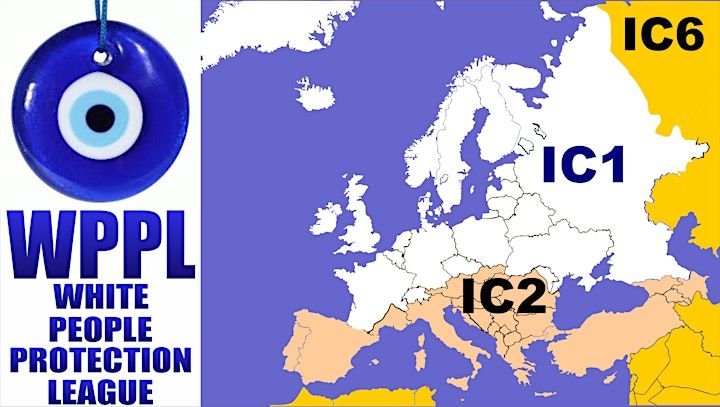
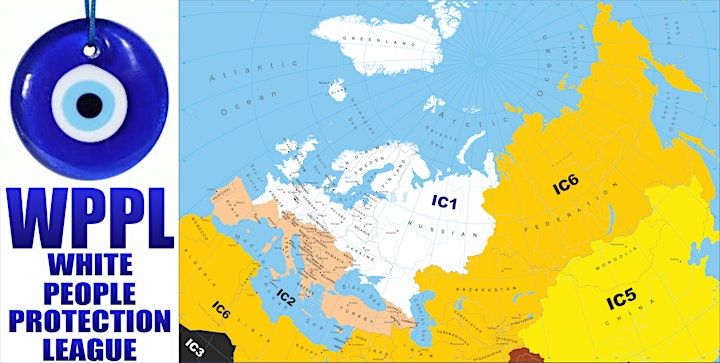
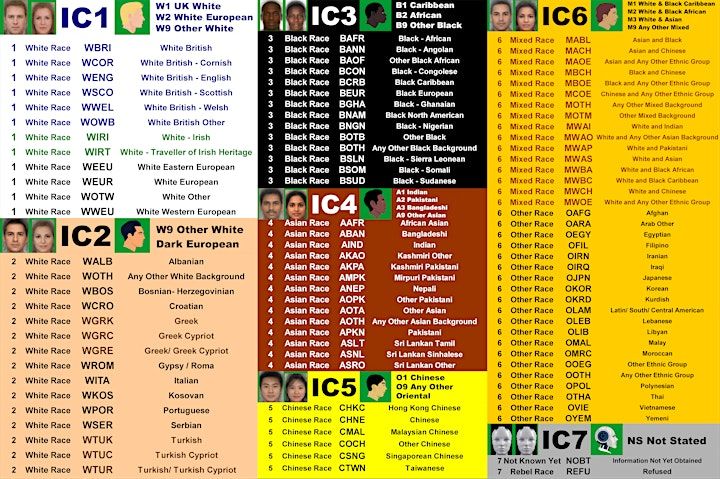
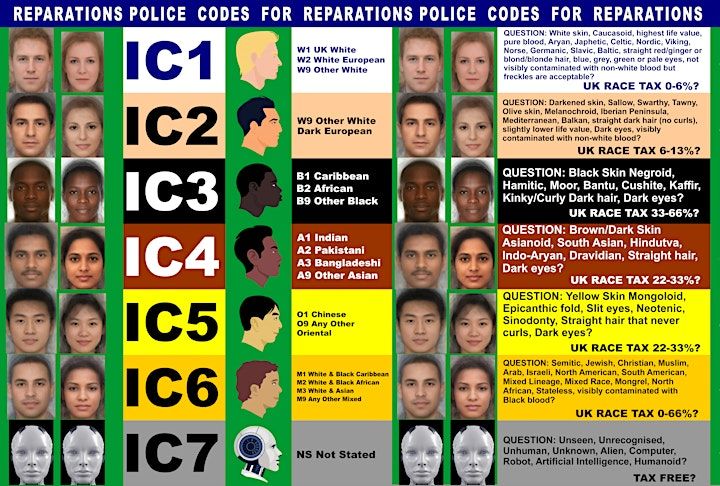


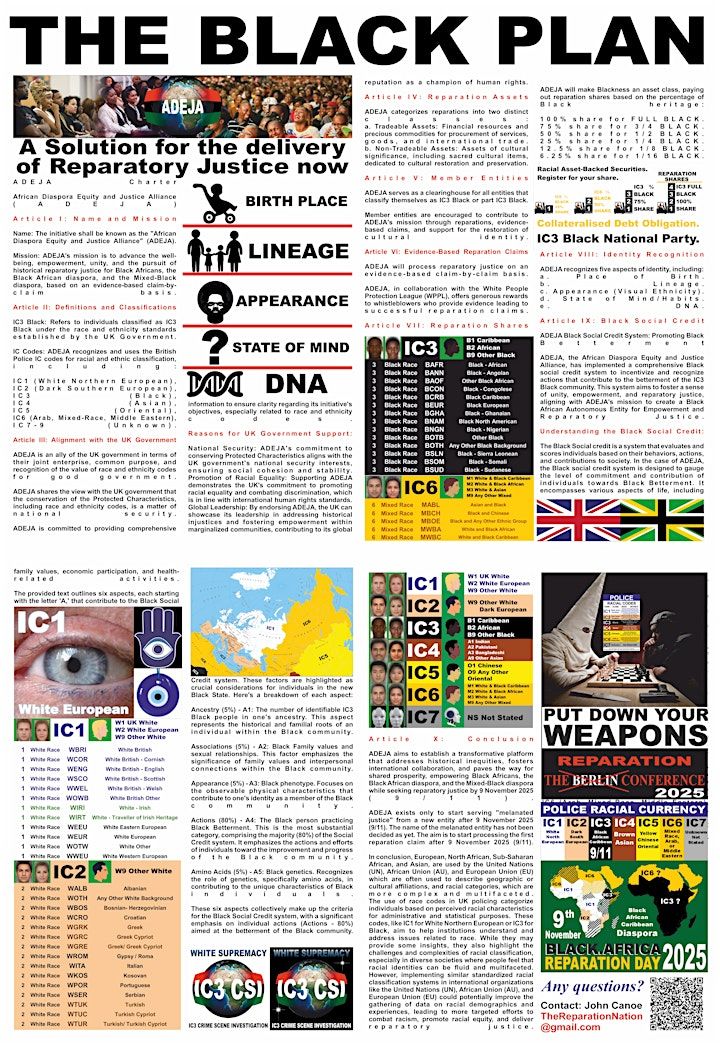
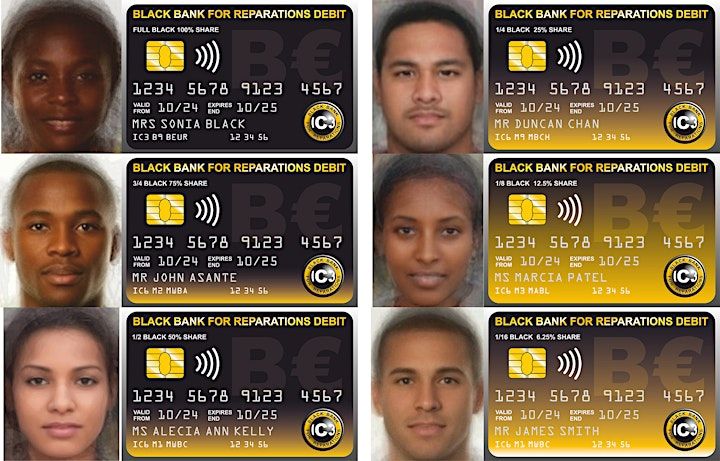
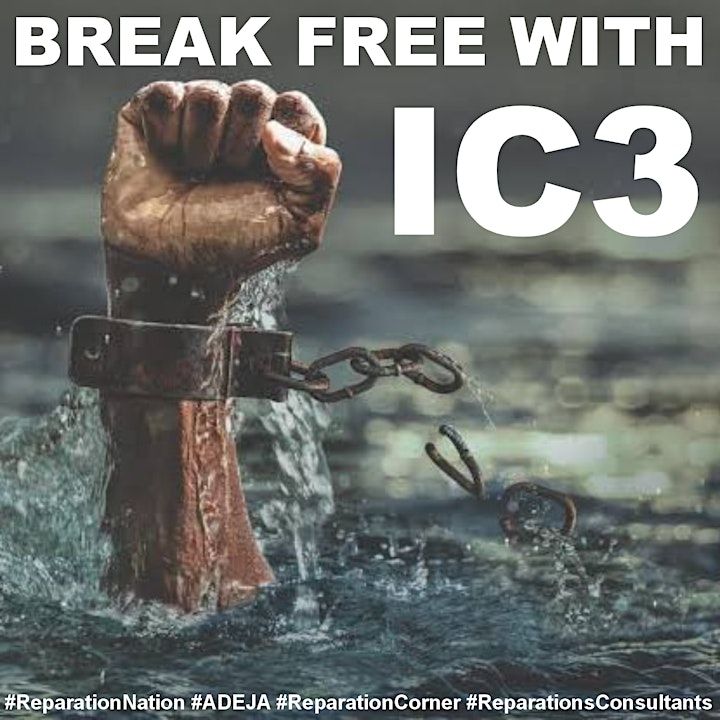
Event Venue & Nearby Stays
SOAS University of London, 10 Thornhaugh Street, London, United Kingdom
GBP 0.00












